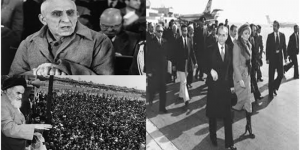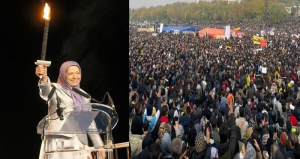Feb. 11, 2024, marks the 45th anniversary of the Iranian Revolution, a pivotal moment in the nation’s history that fundamentally altered its political landscape. The overthrow of the Shah’s monarchy in 1979 by a popular uprising against the oppressive regime.

The Shah’s dictatorship, characterized by repression, and brutalety against dissent, had long been a source of anger among the Iranian people.The 1953 coup against Prime Minister Mohammad Mossadegh, orchestrated by foreign powers fueled the flames of opposition.

The Shah’s secret police, SAVAK, marked by , torture, and elimination of political dissent, only deepen the resentment harbored by the Iranian’s. The leadership vacuum allowed Khomeini to hijack the revolution and establish the absolute rule of the Faqih.
The Shah’s dictatorship, characterized by repression, censorship, and brutal tactics against dissent, had long been a source of anger among the Iranian people.
— NCRI
PARIS, FARANCE, February 9, 2024 /EINPresswire.com/ — The National Council of Resistance of Iran (NCRI) Foreign Affairs Committee in an article published that February 11, 2024, marks the 45th anniversary of the Iranian Revolution, a pivotal moment in the nation’s history that fundamentally altered its political landscape. The overthrow of the Shah’s monarchy in 1979 by a popular uprising represented the culmination of decades of discontent and resistance against the oppressive regime.
The Shah’s dictatorship, characterized by repression, censorship, and brutal tactics against dissent, had long been a source of anger among the Iranian people.
The 1953 coup against Prime Minister Mohammad Mossadegh, orchestrated by foreign powers and executed through the Shah’s thugs, further fueled the flames of opposition.
The reign of the Shah’s secret police, SAVAK, marked by imprisonment, torture, and suppression of political dissent, only served to deepen the resentment harbored by the Iranian populace.
The revolution of 1979 was not a spontaneous event but the result of years of struggle led by various political groups, including the Fadayan Organization and the People’s Mojahedin Organization of Iran (PMOI/MEK). However, despite their efforts, the MEK faced arrests, torture, and imprisonment.
This leadership vacuum allowed Ayatollah Khomeini to hijack the revolution and establish the absolute rule of the Faqih, ushering in a new era of religious authoritarianism.
The subsequent establishment of the theoretical regime under Khomeini’s leadership marked a shift in the country’s political landscape. Still, it did not bring about the democratic reforms many had hoped for.
Instead, the new regime perpetuated repression, censorship, and human rights abuses, both domestically and abroad. The export of terrorism and warmongering became strategic pillars of the regime’s foreign policy, serving as a distraction from its failures at home.
Despite facing brutal repression, the MEK emerged as the primary opposition force against the regime, garnering support from diverse segments of Iranian society. Through grassroots organizing and activism, the MEK exposed the true nature of the mullahs’ regime and mobilized widespread resistance against its oppressive rule.
The establishment of the National Council of Resistance of Iran (NCRI), a coalition of opposition groups including the MEK, provided a unified platform for the Iranian people to challenge the regime and advocate for democratic change.
The NCRI’s rejection of both the Shah’s monarchy and the mullahs’ theocracy symbolized a commitment to freedom, democracy, and human rights.
Over the years, the regime has employed various tactics to maintain its grip on power, including propaganda, repression, and manipulation of internal and external conflicts. However, the Iranian people have continued to resist, rejecting false promises of reform and demanding genuine democratic change.
In the 2017 uprising, the people rejected the deceptive notion of reformists within the regime with their slogan “The end of the reformist and fundamentalist game,” and in 2022, the people of Iran rejected the remnants of the Shah with the slogan “Death to the oppressor; be it the Shah or the leader (Khamenei)”.
Recent uprisings, including those from 2017 to 2022, have underscored the depth of popular discontent and the resilience of the opposition movement.
The MEK’s Resistance Units have played a pivotal role in organizing and sustaining these protests. In the face of repression and tyranny, the Iranian people have demonstrated unwavering courage and resilience, standing up against a regime that denies them their most fundamental rights.
The uprisings precipitated a profound crisis within the regime, leading to its destabilization. Faced with an overthrow crisis, the regime resorted to its typical strategy: generating a significant crisis in the region to deflect attention from internal turmoil. Pursuing this objective, the regime fomented conflict in the Middle East and engendered regional destabilization through its proxy groups.
This situation unequivocally underscored that the prospect of overthrowing the clerical regime and initiating another revolution by the Iranian people would not only liberate Iran and establish democracy but also mitigate the regime’s propensity for war-mongering and terrorism exportation, thus fostering peace and stability in the region. In essence, regional peace and stability hinge upon the overthrow of the clerical regime.
“Our best allies and our partners for an effective strategy to counter the regime’s destructive role in the Middle East are the Iranian people and their organized resistance movement, led by Madam Rajavi,” said Lord Alton during a conference at the House of Commons on January 31, 2024. He added, “Her Ten-Point Plan, her sort of decalogue for the region, these are crucial things about the future of Iran. They provide a roadmap to a democratic regime. It offers a clear and long-standing Iranian solution to the threats of the regime, not a solution engineered by the United States or the United Kingdom or the European Union, engineered by Iranian people for the future of Iran.”
Lord Alton also emphasized the international consensus regarding the regime’s threat and the importance of supporting the Iranian people’s democratic alternative. He underscored the Iranian people’s right to rebel against repression and tyranny, a right enshrined in the Universal Declaration of Human Rights.
In a recent debate in the House of Commons, British Member of Parliament Bob Blackman emphasized the humanitarian imperative to oppose the Iranian regime, stating that supporting the Iranian people and acknowledging the legitimacy of their opposition is essential for achieving a free and democratic Iran.
Similarly, Members of Parliament Martyn Day highlighted the regime’s extensive use of repression to silence dissent and persecute political activists, particularly those advocating for democratic change. Despite facing brutal suppression, the organized resistance, particularly the People’s Mojahedin Organization of Iran (MEK), remains determined to establish a free, democratic, and secular republic.
Women leaders within the resistance movement have played a crucial role in advancing the cause of freedom in Iran. Baroness Eaton emphasized the need to support Iranian women and youths in their fight against the oppressive Islamic Revolutionary Guard Corps (IRGC) and their demands for a democratic republic.
Anna Firth MP praised the MEK Resistance Units for their relentless efforts to challenge the regime’s authority and inspire hope for a better future. She emphasized the importance of international solidarity in supporting the legitimate struggles of the Iranian people.
The sentiments expressed by British lawmakers are echoed by their counterparts in France. Cécile Rilhac, a French Member of Parliament, condemned the regime’s destructive role in the region and emphasized the Iranian people’s right to resist oppression. She underscored the importance of supporting the MEK Resistance Units in their fight against the IRGC.
Former Belgian Prime Minister Guy Verhofstadt called for Western recognition of the Iranian people’s legitimate right to resist the regime. He highlighted the need to support the democratic alternative to the mullah regime, citing Maryam Rajavi’s Ten-Point Plan as a potential roadmap for the future of Iran.
French Member of Parliament André Chassaigne emphasized the historical significance of the Iranian people’s resistance, likening it to past struggles against tyranny. He stressed the moral obligation to stand in solidarity with the Iranian Resistance, echoing the sentiments of his fellow lawmakers.
As Iran commemorates the 45th anniversary of the revolution, it stands at a crossroads. The regime’s oppressive policies have fueled discontent and resistance, while its attempts to export crises abroad have only further isolated it on the world stage.
The Iranian people, led by the organized resistance of the MEK, remain determined to overthrow the regime and establish a democratic republic based on freedom, justice, and equality.
The Iranian people’s fight for freedom is not only a struggle for their own rights but also a beacon of hope for the people of the region. As the international community rallies behind their cause, the Iranian people’s right to resist tyranny must be recognized and supported at every turn.
To subscribe weekly Newsletter of NCRI, please use this link. https://bit.ly/3SMgEla
Shahin Gobadi
NCRI
+33 6 61 65 32 31
email us here
Recent uprisings, including those from 2017 to 2022, have underscored the depth of popular discontent and the resilience of the opposition movement.
![]()
Originally published at https://www.einpresswire.com/article/687267162/video-perspectives-on-change-the-ongoing-legacy-of-iran-s-1979-revolution




